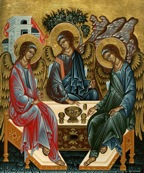 Over the holidays, my mother was attempting to explain Mormonism to a 14-year-old boy who lives with her and my dad. He’s got a Mormon friend and he was wondering about that faith, especially because he’s in confirmation class this year and learning more about Christianity.
Over the holidays, my mother was attempting to explain Mormonism to a 14-year-old boy who lives with her and my dad. He’s got a Mormon friend and he was wondering about that faith, especially because he’s in confirmation class this year and learning more about Christianity.
My mom looked at me and asked, “Are Mormons Christian?” It’s interesting that she didn’t ask if, in my opinion, Mormons are Christian, but more as a matter-of-fact. This, of course, opens that millennia-old can o’ worms: Who gets to say who is and who is not “Christian”? (More on that in another post.)
My immediate response was, “They do consider themselves part of Christianity, but they’re not. They don’t believe in the Trinity.”
In fact, that wasn’t quite right. The Church of Latter Day Saints does believe in a trinity, per se, but not the orthodox Christian Trinity as articulated at the Council of Nicaea (325). Mormons understand the Godhead to be three distinct divine beings who eternally relate to one another. At Nicaea and after, the orthodox belief has been that God is three persons (hypostases) but one substance (homoousias). I, myself, tend toward the social trinitarianism articulated by theologians such as Jürgen Moltmann and Miroslav Volf. While Moltmann has ocassionally been accused of tri-theism, that charge doesn’t stick based on a thorough reading of his work.
But that’s less my query than the importance of the Trinity for a claim of Christianity. I’m sure that many of my conservative Christian readers won’t even have to consider this question, and neither will the liberals. I’m more interested in those of you who are moderates. Put the LDSers aside for the moment. How about Unitarians? They do trace their origins to Protestantism, and many consider themselves Christian, though others do not. Indeed, some Unitarians (a minority, to be sure) have a traditional (or “high”) Christology.
So my question is basically this: Is an orthodox Christology enough to be considered Christian, or must one also articulate a Nicaean Trinitarianism?
